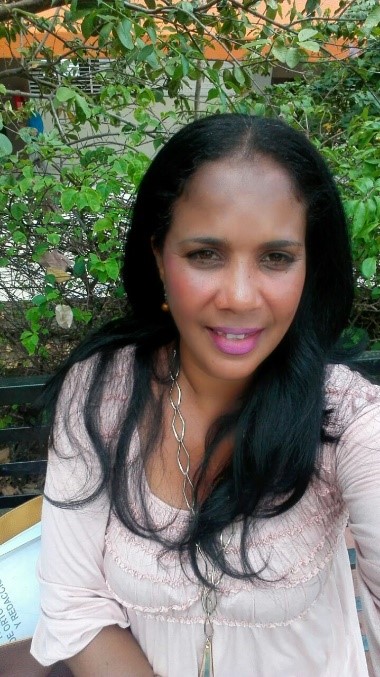Interviewee: Altagracia de la Rosa, Peer Educator, CEPROSH, Dominican Republic
Interviewer: Betty Alvarez, Consultant, FHI 360
Altagracia de la Rosa is a promotora, or peer educator, working with sex workers on behalf of CEPROSH in Puerto Plata, Dominican Republic. CEPROSH has more than 30 years of experience in HIV programming, including prevention, care, and treatment programs for members of key populations. Altagracia has been a peer educator for HIV-focused projects for 28 years. Her experiences as both a sex worker and long-term peer educator give her an important perspective on a new initiative, led by CEPROSH, that focuses on preventing violence and improving services for individuals, like sex workers, who experience violence.
Describe the previous projects you’ve worked with.
I’ve worked on two other projects with CEPROSH: Prevention Education (Educacion sobre Prevencion), which was specifically focused on female sex workers (FSWs), and one that was open to both general and key populations, where my main work was to get people to test for HIV.
What do you think is different, in terms of how you are received by sex workers, since beginning to talk specifically about violence?
This is a new subject; the girls already know the basics about HIV and sexual health, but nobody had talked to them about violence, and this has made a big impact. The subject is interesting to them because they have suffered many types of violence.
It is easier to address them [when talking about violence], and they are more willing to talk with me and participate in activities because they want to know more about the subject of violence and the available services, especially the services that are free, and the types of help they are able to get from CEPROSH and other partners.
We didn’t get so many girls to come to CEPROSH before, or at least they didn’t come that soon to seek services. But now they understand the dangers they are exposed to and that they have time limits to get things like post-exposure prophylaxis (PEP) and emergency contraception (EC). They have realized that they’ve been victims of violence, and this knowledge has empowered them to take actions about their health. Even several transgender women that do sex work have approached me requesting information and asking to participate in activities.
Has talking about violence caused you to interact with different groups of sex workers?
The street-based girls are the ones who approach me the most, because the girls who are based in brothels feel safer from violence.
Does talking about violence during outreach make people think of CEPROSH differently?
The subject of violence definitely makes people see CEPROSH with better eyes, because now they know there are more services available and that they are not just for people living with HIV (PLHIV). Free services like HIV and STI tests and other services that are also free for FSWs, like pap smears, and that are unrelated to their HIV status are also a big reason for them to come to CEPROSH.
How do you help people to understand the link between HIV and violence?
I explain what HIV is and the fact that if they are victims of violence their risk of getting HIV and other STIs is higher. Then I give them some examples of violent situations that could lead to health issues, like forced sex without a condom.
Do you feel differently about your work as a promotora now than you did in the past?
I feel that this subject makes me identify more with the sex workers I am reaching out to because my daughter used to be a victim. This work has helped me a lot to understand what my daughter went through, how to handle it better and address her properly, and at the same time this knowledge and experience have helped me to help others.
I feel that by addressing violence I’m able to create a better connection with the people I talk to and they are more willing to trust me.
